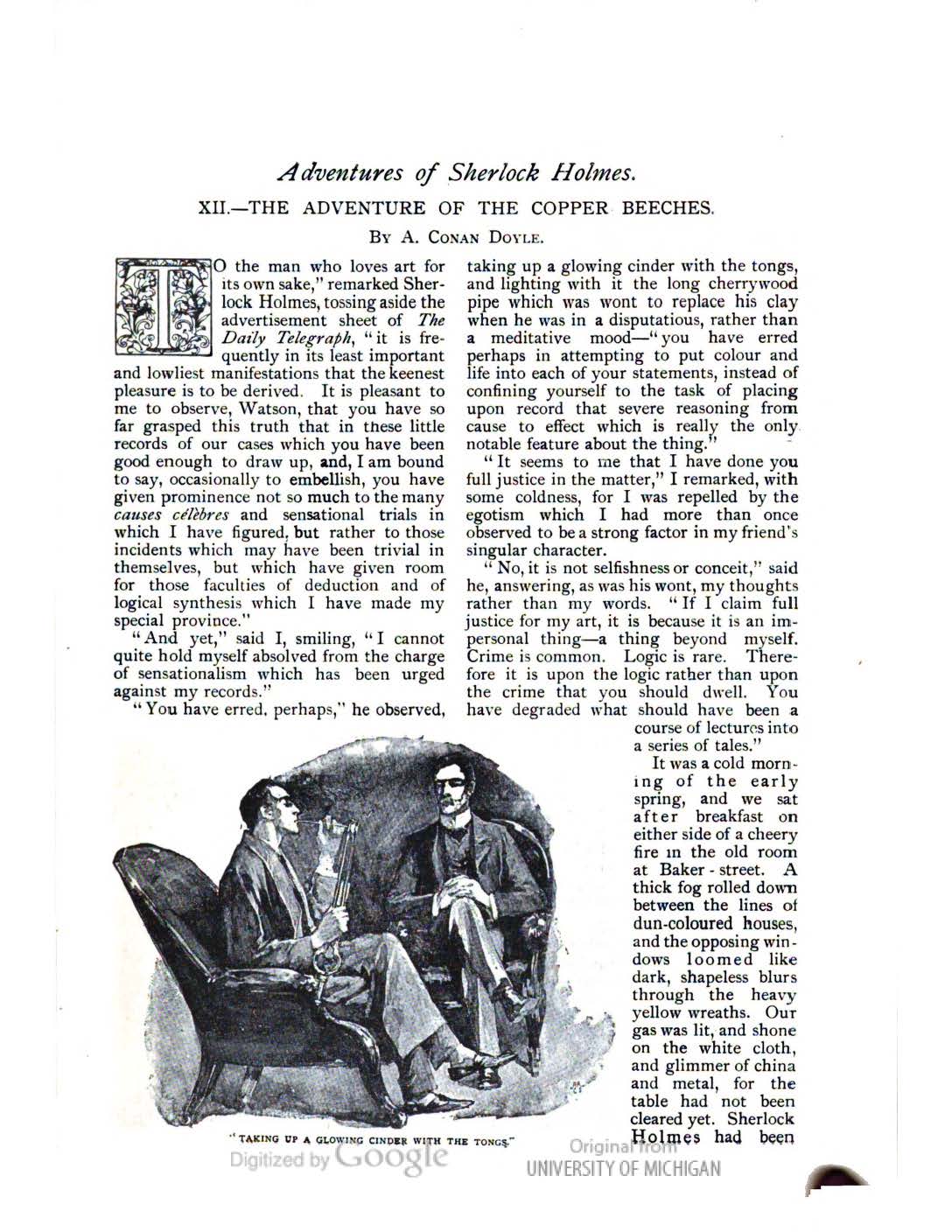"The Adventure of the Copper Beeches"
By
Arthur Conan Doyle
614 silent all the morning, dipping continuously into the advertisement columns of a succession of papers, until at last, having apparently given up his search, he had emerged in no very sweet temper to lecture me upon my literary shortcomings.
“At the same time," he remarked, after a pause, during which he had sat puffing at his long pipe and gazing down into the fire, “you can hardly be open to a charge of sensationalism, for out of these cases which you have been so kind as to interest yourself in, a fair proportion do not treat of crime, in its legal sense, at all. The small matter in which I endeavoured to help the King of Bohemia, the singular experience of Miss Mary Sutherland, the problem connected with the man with the twisted lip, and the incident of the noble bachelor, were all matters which are outside the pale of the law. But in avoiding the sensational, I fear that you may have bordered on the trivial."
“The end may have been so," I answered, “but the methods I hold to have been novel and of interest."
“Pshaw, my dear fellow, what do the public, the great unobservant public, who could hardly tell a weaver by his toothweaverweaver A weaver was a person who wove fabric. Although it is difficult to discern from sourcing exactly where this saying derives from, it is generally thought that a person who wove as an occupation would have worn down teeth, as they would bite or chew the yarn/thread to sever it if their hands were busy with other tasks. - [AC] or a compositor by his left thumbcompositorcompositor A compositor was a person who set the type for printing books, magazines, newspapers, etc. The compositor would use a composing stick to set the type, holding the stick in one hand (usually the left), and setting the type in with the other (usually the right). Therefore, the thumb that held the type in place was usually the left, meaning that a compositor would likely form a callus on the left thumb. - [AC], care about the finer shades of analysis and deduction! But, indeed, if you are trivial, I cannot blame you, for the days of the great cases are past. Man, or at least criminal man, has lost all enterprise and originality. As to my own little practice, it seems to be degenerating into an agency for recovering lost lead pencils, and giving advice to young ladies from boarding-schools. I think that I have touched bottom at last, however. This note I had this morning marks my zero point, I fancy. Read it! " He tossed a crumpled letter across to me.
It was dated from Montague-place upon the preceding evening, and ran thus:—
“Dear Mr. Holmes,—I am very anxious to consult you as to whether I should or should not accept a situation which has been offered to me as governess. I shall call at half-past ten to-morrow, if I do not inconvenience you.
—Yours faithfully, VIOLET HUNTER."“Do you know the young lady ? " I asked.
“Not I."
“It is half-past ten now."
“Yes, and I have no doubt that is her ring."
“It may turn out to be of more interest than you think. You remember that the affair of the blue carbuncle, which appeared to be a mere whim at first, developed into a serious investigation. It may be so in this case, also."
“Well, let us hope so ! But our doubts will very soon be solved, for here, unless I am much mistaken, is the person in question."
As he spoke the door opened, and a young lady entered the room. She was plainly but neatly dressed, with a bright, quick face, freckled like a plover’s egg, and with the brisk manner of a woman who has had her own way to make in the world.
“You will excuse my troubling you, I am sure," said she, as my companion rose to greet her; “but I have had a very strange experience, and as I have no parents or relations of any sort from whom I could ask advice, I thought that perhaps you would be kind enough to tell me what I should do."
“Pray take a seat, Miss Hunter. I shall be happy to do anything that I can to serve you."
I could see that Holmes was favourably impressed by the manner and speech of his new client. He looked her over in his searching fashion, and then composed himself with his lids drooping and his finger tips together to listen to her story.
“I have been a governess for five years," said she, “in the family of Colonel Spence Munro, but two months ago the Colonel received an appointment at Halifax, in Nova Scotia, and took his children over to America with him, so that I found myself without a situation. I advertised, and I answered advertisements, but without success. At last the little money which I had saved began to run short, and I was at my wit’s end as to what I should do.
“There is a well-known agency for governesses in the West-end called Westaway’s, and there I used to call about once a week in order to see whether anything had turned up which might suit me. Westaway was the name of the founder of the business, but it is really managed by Miss Stoper. She sits in her own little office, and the ladies who are seeking employment wait in an ante-room, and are then shown in one by one, when she consults her ledgers, and sees whether she has anything which would suit them.
“Well, when I called last week













